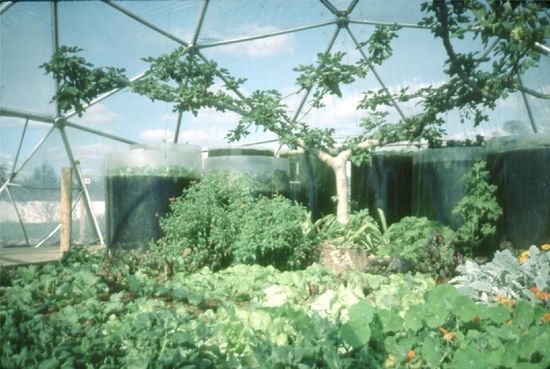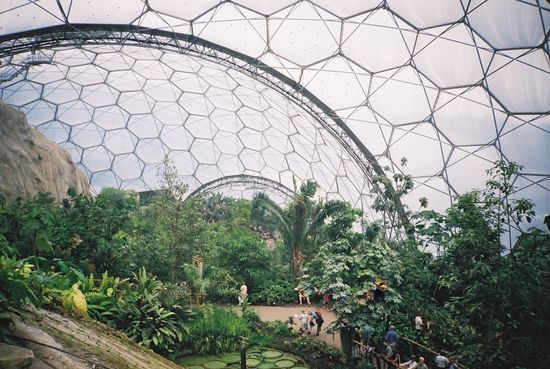Fluoropolymers: Difference between revisions
(→Related Links: + link) |
mNo edit summary |
||
| Line 4: | Line 4: | ||
==About== | ==About== | ||
These are high-performance plastic materials such as [https://en.wikipedia.org/wiki/Polytetrafluoroethylene PTFE] ("Teflon") [https://en.wikipedia.org/wiki/ETFE ETFE] (Tefzel"). They have very interesting properties such as UV resistance, elasticity, resistance to corrosion from most substances and very good high temperature performance. Fluoropolymer foil is useful as [[greenhouse]] covering and for [[Aluminum Extraction From Clays]]. The UV resistance of these materials results in long life, with up to 30 years reported with minimal degradation. | These are high-performance plastic materials such as [https://en.wikipedia.org/wiki/Polytetrafluoroethylene PTFE] ("Teflon") [https://en.wikipedia.org/wiki/ETFE ETFE] ("Tefzel"). They have very interesting properties such as UV resistance, elasticity, resistance to corrosion from most substances and very good high temperature performance. Fluoropolymer foil is useful as [[greenhouse]] covering and for [[Aluminum Extraction From Clays]]. The UV resistance of these materials results in long life, with up to 30 years reported with minimal degradation. | ||
Also, UV transmission leads to a more "natural" light spectrum inside the greenhouse, suppressing microbes that may otherwise survive if UV light is blocked off. Fluoropolymers are slowly catching on as greenhouse covering but are still much more expensive than current alternatives such as polyethylene and [[polycarbonate]]. This may be due to lower overall production volume rather than inherently higher cost of the process. Drawbacks include high cost (10x that of polycarbonate), susceptibility to puncture holes and movement/wind, which is why fluoroplastic foil is often inflated as cushions (see images: "Pillow Dome" and "Eden Project"). Thicker membranes are possible but much more expensive. | Also, UV transmission leads to a more "natural" light spectrum inside the greenhouse, suppressing microbes that may otherwise survive if UV light is blocked off. Fluoropolymers are slowly catching on as greenhouse covering but are still much more expensive than current alternatives such as polyethylene and [[polycarbonate]]. This may be due to lower overall production volume rather than inherently higher cost of the process. Drawbacks include high cost (10x that of polycarbonate), susceptibility to puncture holes and movement/wind, which is why fluoroplastic foil is often inflated as cushions (see images: "Pillow Dome" and "Eden Project"). Thicker membranes are possible but much more expensive. | ||
==Uses== | ==Uses== | ||
* greenhouse covering (as foil) | * [[greenhouse]] covering (as foil) | ||
* corrosion-resistant containers and equipment | * corrosion-resistant containers and equipment | ||
| Line 18: | Line 18: | ||
* BuildItSolar: [http://www.builditsolar.com/References/Glazing/DuPontFilms.htm "DuPont Plastic Film Glazing"] | * BuildItSolar: [http://www.builditsolar.com/References/Glazing/DuPontFilms.htm "DuPont Plastic Film Glazing"] | ||
* [http://www.f-clean.nl/ F-CLEAN] is a Dutch supplier of ETFE film for horticultural greenhouses (useful technical information there) | * [http://www.f-clean.nl/ F-CLEAN] is a Dutch supplier of ETFE film for horticultural greenhouses (useful technical information there) | ||
[[Category:Food and Agriculture]] | |||
[[Category:Housing and construction]] | |||
Revision as of 18:35, 18 March 2017


About
These are high-performance plastic materials such as PTFE ("Teflon") ETFE ("Tefzel"). They have very interesting properties such as UV resistance, elasticity, resistance to corrosion from most substances and very good high temperature performance. Fluoropolymer foil is useful as greenhouse covering and for Aluminum Extraction From Clays. The UV resistance of these materials results in long life, with up to 30 years reported with minimal degradation.
Also, UV transmission leads to a more "natural" light spectrum inside the greenhouse, suppressing microbes that may otherwise survive if UV light is blocked off. Fluoropolymers are slowly catching on as greenhouse covering but are still much more expensive than current alternatives such as polyethylene and polycarbonate. This may be due to lower overall production volume rather than inherently higher cost of the process. Drawbacks include high cost (10x that of polycarbonate), susceptibility to puncture holes and movement/wind, which is why fluoroplastic foil is often inflated as cushions (see images: "Pillow Dome" and "Eden Project"). Thicker membranes are possible but much more expensive.
Uses
- greenhouse covering (as foil)
- corrosion-resistant containers and equipment
Related Links
- OSE Wiki page: Pillow Dome
- J. Baldwin publications from: The Journal of the New Alchemists (both .pdf): "The Pillow Dome" (1985) and "A Dome Bioshelter as a Village Component" (1981)
- American Durafilm: "It’s Easy Being Green with Tefzel® ETFE: 8 Great Properties" and "4 Advantages of Tefzel® ETFE Film for a Greenhouse Covering"
- BuildItSolar: "DuPont Plastic Film Glazing"
- F-CLEAN is a Dutch supplier of ETFE film for horticultural greenhouses (useful technical information there)